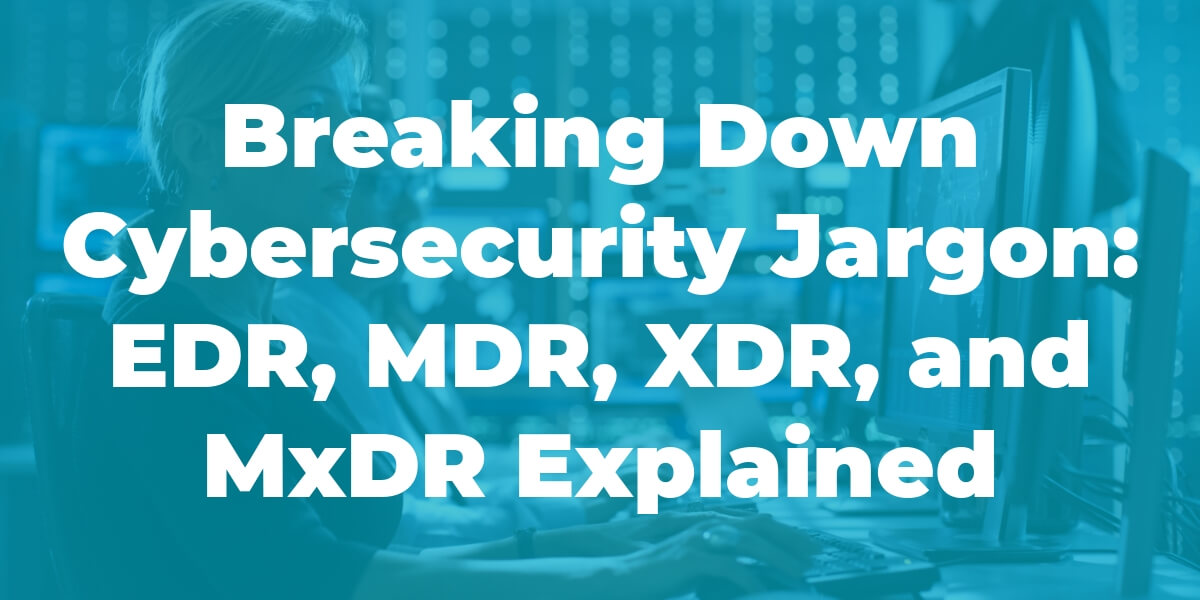The cybersecurity landscape is ever-evolving, creating the need for businesses to stay updated on the latest technologies and strategies. Amongst these are EDR, MDR, XDR, and MxDR, buzzwords that are making waves in the cybersecurity world. But what do they signify, and how do they factor into your cybersecurity plan? In this detailed guide, we will demystify these acronyms, providing a comprehensive understanding of what they mean for your cybersecurity needs.
EDR - Endpoint Detection and Response
EDR, or Endpoint Detection and Response, plays a critical role in modern cybersecurity strategies. As businesses have become increasingly digital, the number of endpoints (devices like computers, laptops, and mobile phones) has grown exponentially. This growth also means an expanded threat landscape.
EDR technology provides continuous monitoring and response to potential threats at these endpoints. It detects unusual activity or deviations from normal operations, enabling a swift response to neutralize threats. Traditional antivirus systems are limited to identifying known threats, but EDR uses behavioral analysis to detect novel threats and attacks.
This increased visibility and real-time threat protection empower businesses to anticipate, prevent, and respond to cyber threats swiftly and effectively, strengthening the overall security posture.
MDR - Managed Detection and Response
Managed Detection and Response (MDR) is the next step in the evolution of cybersecurity strategies. MDR builds on EDR and involves outsourcing the monitoring, detection, and response tasks to a team of external cybersecurity experts.
These MDR service providers use advanced technology to track, detect, and respond to threats on your devices. This service comes with a significant advantage: access to specialized cybersecurity expertise without the cost and time required to build and maintain in-house capabilities.
MDR providers can analyze threat patterns, provide real-time alerts, and even take remedial action to mitigate the impact of a security breach. They also typically offer a 24/7 service, giving businesses peace of mind and the freedom to focus on their core operations.
XDR - Extended Detection and Response
XDR, or Extended Detection and Response, broadens the cybersecurity perspective beyond just endpoints. While EDR focuses on endpoints, XDR integrates multiple security products into a unified system that extends its gaze to network traffic, servers, email, and cloud environments.
This consolidation of different security technologies gives businesses a more holistic view of their cybersecurity landscape. It enables cross-correlation of data from various sources, leading to improved threat detection and response capabilities.
XDR can help businesses detect more complex threats that might have been overlooked in a narrower security setup. It provides more contextualized insights, offering a broader and more accurate understanding of potential threats.
MxDR - Managed Extended Detection and Response
MxDR is the convergence of MDR and XDR and represents the pinnacle of cybersecurity services. It combines the benefits of both managed services and a wide-ranging security outlook to deliver comprehensive security solutions.
Like MDR, MxDR services are provided by external experts who manage your cybersecurity needs. The difference is the extension of these services beyond endpoints to cover your entire digital infrastructure.
MxDR service providers use cutting-edge technologies like artificial intelligence and machine learning to deliver threat detection, response, and predictive analytics, across all digital platforms. This comprehensive approach facilitates a more proactive and predictive stance in cybersecurity, helping businesses thwart threats before they can cause substantial damage.
Cybersecurity threats are growing increasingly complex, and so are the strategies and tools used to combat them. Whether you're considering EDR, MDR, XDR, or MxDR, it's essential to understand the unique capabilities each strategy brings to your cybersecurity arsenal.
The choice of strategy should align with your company's size, industry, regulatory obligations, and specific security requirements. While the prospect of selecting the appropriate cybersecurity strategy might seem daunting, remember that expert help is available.
Our team at Ignite Solutions Group is dedicated to guiding you through these complexities, providing expert counsel and services tailored to your business's specific needs. Together, we can build a robust cybersecurity posture for your business.
